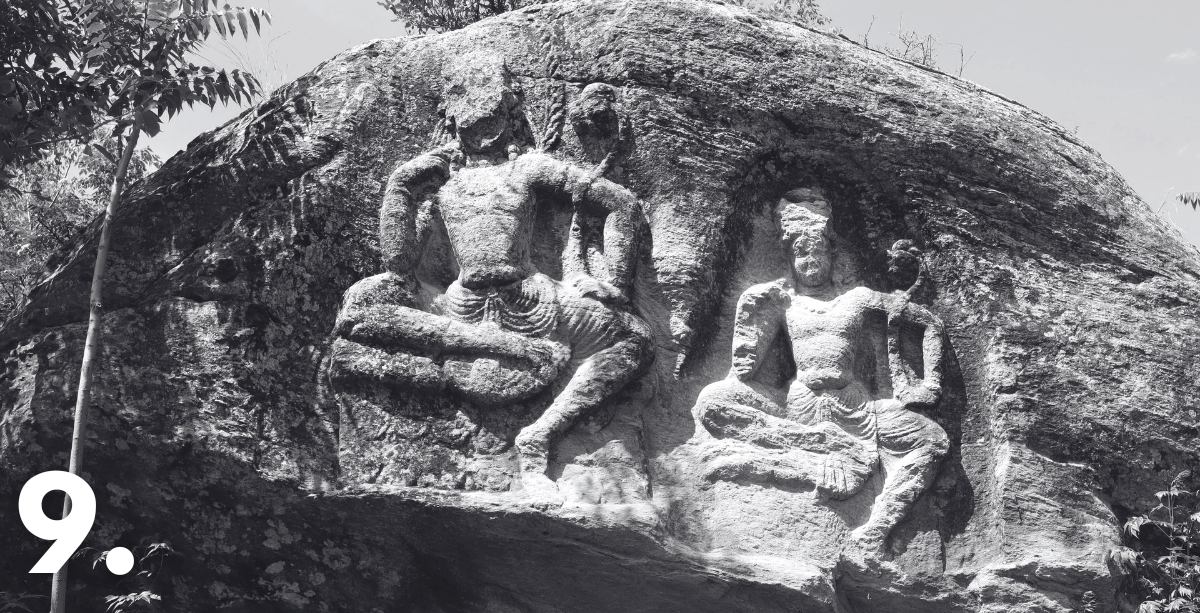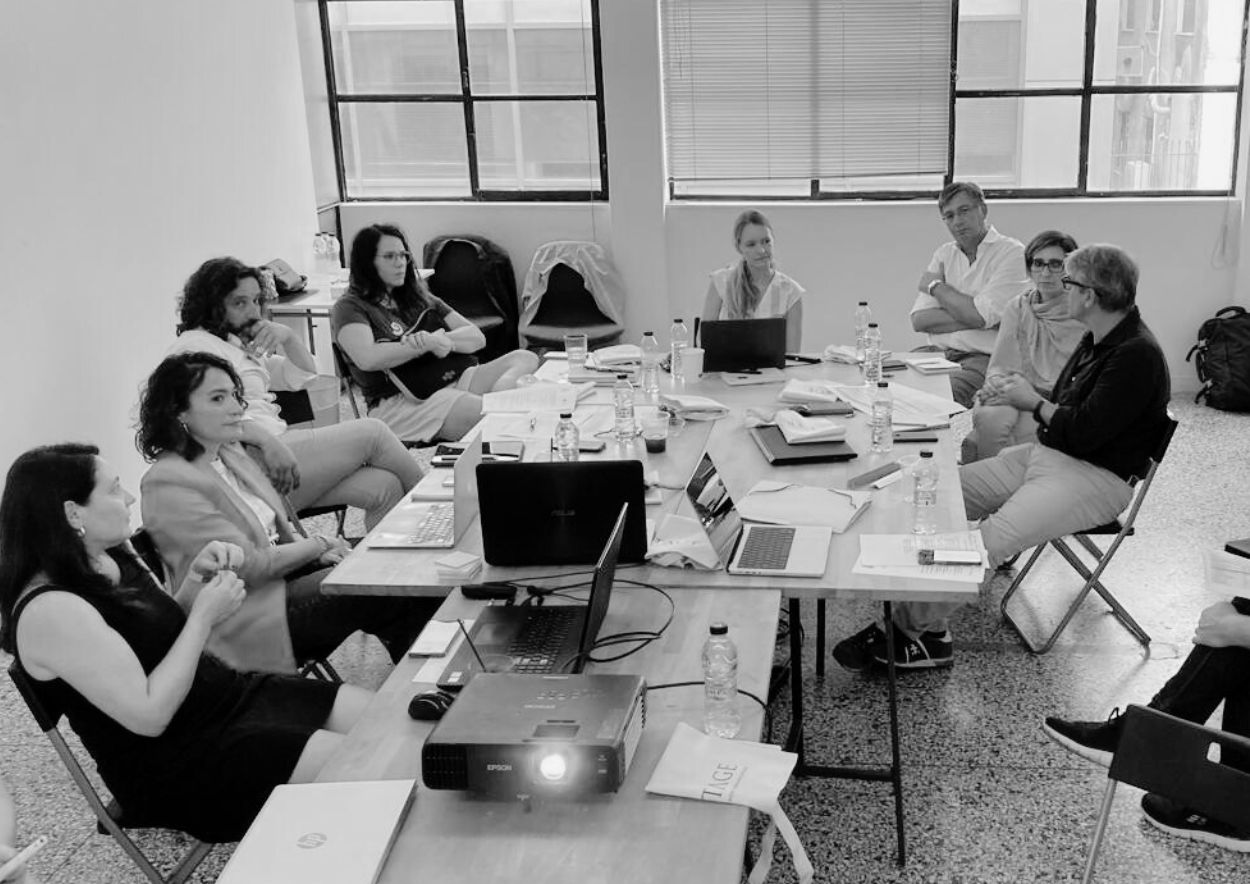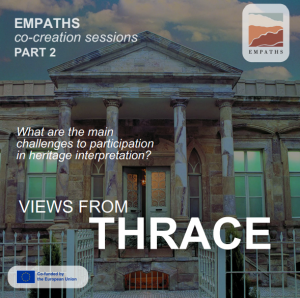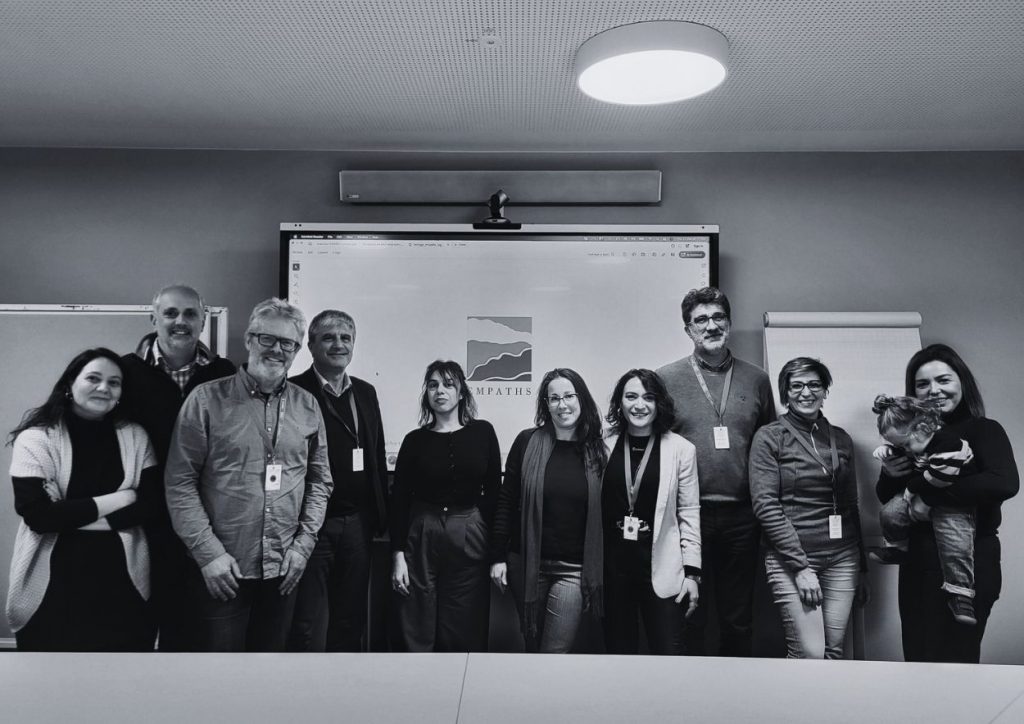: EMPATHS Project Erasmus+
HERITΛGE 2025 Wrap-Up
In 2025, HERITΛGE continued to translate its mission of community-centred, inclusive, and sustainable heritage management into action across continents. From building local capacity across the world to advancing digital innovation and participatory practice in Europe and beyond, the year was defined by strong partnerships, expanded training, and tangible impact. HERITΛGE’s work in 2025 demonstrated how heritage can act as a driver of resilience, dialogue, and long-term social value, rooted in communities, connected globally, and oriented firmly toward the future.
1.The HerMaP Gambia successful completion
In February, HERITΛGE marked the successful completion of HerMaP Gambia, an initiative co-funded by the EU, by celebrating a milestone in community-driven heritage management. A certificate ceremony and visual art exhibition was held as part of The Gambia’s 60th Independence Anniversary celebrations, bringing together EU representatives, parliamentarians, and the Chair of the National Assembly to honour the dedication of the programme’s trainees. One week later, the Minister of Tourism, Members of Parliament, EU representatives, and a broad range of stakeholders convened for a high-level stakeholder lunch focused on sustaining the transformative results of the project. Already, we are seeing HerMaP Gambia graduates applying their new skills across the country—strengthening local heritage initiatives, engaging communities, and even training others. The programme’s impact is now firmly rooted in the sector, creating momentum that will shape heritage management in The Gambia for years to come.
2. HerMaP Africa: Building Capacity and Partnerships Across Three Countries
In 2025, HERITΛGE deepened its impact across Ethiopia, Ghana, and Rwanda through targeted capacity building, strategic partnerships, and close engagement with local cultural ecosystems, as part of the HerMaP Africa initiative supported by the Mellon Foundation. In Ethiopia, HERITΛGE delivered seven workshops and trained 127 participants, with a strong emphasis on hands-on, in-person conservation training. Notably, conservation workshops in Harar focused on equipping the next generation of staff from the Culture and Tourism Bureau with practical skills to safeguard this unique living heritage site, reinforcing long-term, community-based preservation. Institutional collaboration was further strengthened through the signing of two Memoranda of Understanding with key Ethiopian organisations. In Ghana, HERITΛGE delivered four workshops and trained 80 participants, ensuring broad regional representation and inclusive access to capacity building beyond major urban centres. A national networking roundtable brought together stakeholders and project leaders to exchange experiences, align priorities, and address shared challenges in the heritage sector, alongside the signing of two strategic MoUs. In Rwanda, four workshops trained 78 participants, and three MoUs were signed with leading institutions, including a milestone partnership with the Ministry of Youth and Arts. HERITΛGE also contributed to the Ubumuntu Arts Festival through programme consultations and a participatory session with young creatives, strengthening connections between heritage, contemporary culture, and youth engagement. Across all three countries, a dedicated Train-the-Trainers programme equipped 19 heritage professionals to act as HERITΛGE ambassadors, significantly amplifying local capacity and long-term impact.
3. Small Grants for African Heritage
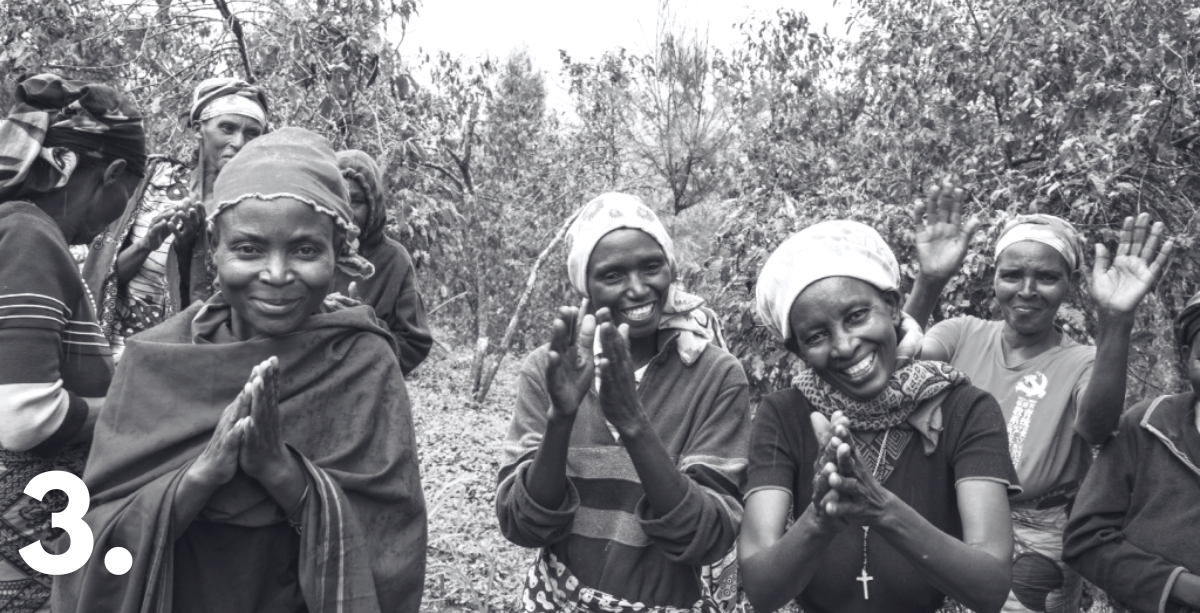 The regranting phase of HerMaP Africa reached its conclusion, marking one of the most ambitious and impactful heritage-support programmes on the continent. Since 2023, HERITΛGE has received more than 2,500 applications from across Africa and funded over 74 small heritage projects, each led by local actors working to safeguard, reinterpret, and activate their cultural heritage. This regranting initiative was made possible with the generous support of the Mellon Foundation. Throughout the year, grantees participated in six regional convenings, creating spaces to exchange experiences, strengthen their skills, and learn from peers—building a growing network of practitioners committed to community-centred heritage work. Several more convenings are planned for 2026 to continue nurturing this collaborative ecosystem. The results have been remarkable: from revitalised cultural practices to restored and more resilient cultural sites, to new opportunities for local development, these projects are already transforming lives. We are proud to showcase this work through dedicated social media features and a new publication that brings together the stories, challenges, and achievements of the HerMaP Africa grantees.
The regranting phase of HerMaP Africa reached its conclusion, marking one of the most ambitious and impactful heritage-support programmes on the continent. Since 2023, HERITΛGE has received more than 2,500 applications from across Africa and funded over 74 small heritage projects, each led by local actors working to safeguard, reinterpret, and activate their cultural heritage. This regranting initiative was made possible with the generous support of the Mellon Foundation. Throughout the year, grantees participated in six regional convenings, creating spaces to exchange experiences, strengthen their skills, and learn from peers—building a growing network of practitioners committed to community-centred heritage work. Several more convenings are planned for 2026 to continue nurturing this collaborative ecosystem. The results have been remarkable: from revitalised cultural practices to restored and more resilient cultural sites, to new opportunities for local development, these projects are already transforming lives. We are proud to showcase this work through dedicated social media features and a new publication that brings together the stories, challenges, and achievements of the HerMaP Africa grantees.
4. HerMaP Mexico: Launching a New Border Region Initiative
This year also marked the launch of HerMaP Mexico, a major new initiative that expands HERITΛGE’s work into North America and supports cultural heritage actors across Mexico’s northern border states. Funded by the Mellon Foundation’s Humanities in Place programme, the project brings a comprehensive, community-focused approach to heritage management through mapping, training, networking, and small grants. In 2025 we established the foundations of the programme: building local partnerships, initiating the mapping of heritage professionals and institutions across six states, and preparing the first round of capacity-building workshops to be delivered in both Spanish and English. HerMaP Mexico responds to the region’s unique cultural landscape—shaped by Indigenous, mestizo, migrant, and Chicano communities—and aims to strengthen local skills while creating new opportunities for collaboration and sustainable development. As the project moves forward, it will support locally led initiatives and grow into a long-term platform that connects heritage practitioners across the border region with global networks and resources.
5. Professional Training and Executive Leadership Education Programmes
HERITΛGE continued to strengthen its leadership in professional training by expanding its Executive Leadership Education programmes and reinforcing its global learning community. A key milestone was the introduction of Community Tourism and Development into the curriculum, responding to the growing need for heritage managers to understand how cultural resources can generate sustainable economic benefits while reinforcing social cohesion, identity, and community resilience. This year also saw the first alumni conference of the Engaging Communities in Cultural Heritage Summer School, bringing together former participants from around the world to share research, field experiences, and community-based practices. Alongside this, HERITΛGE successfully delivered its Conservation Series Training Programmes for the second time, expanding the offer to include First Aid for Finds and Preventive Conservation, and equipping participants with practical skills applicable across diverse heritage contexts. The Training of Trainers (ToT) programme continued to grow, building a global cohort of HERITΛGE Ambassadors—heritage professionals trained to deliver high-quality, cross-cultural capacity building within their own communities. Together, these initiatives reflect HERITΛGE’s ongoing commitment to community-centred heritage management, interdisciplinary collaboration, and the empowerment of professionals working at the intersection of culture, development, and sustainability, supported by a vibrant international network united by shared values and collective impact.
6. Advancing Audience-Centred Heritage Practice through AHEAD
In 2025, HERITΛGE advanced its work on audience-centred heritage practice through AHEAD (Accessible Heritage Experience for Audience Development), a project co-funded by Creative Europe and dedicated to strengthening participation, co-creation, and sustainability across the cultural heritage sector. At the Archaeological Museum of Messara, the project’s Greek hub, HERITΛGE hosted a series of co-creation labs in early 2025, followed by a study visit for AHEAD project partners in May, creating space for peer learning and in-depth exchange around participatory heritage approaches. In July, the 3rd AHEAD Networking Event brought together practitioners and researchers, and featured the presentation of the Living Heritage Network in Greece by Theodosia Maroutsi, highlighting how community-led approaches can be embedded in national heritage ecosystems. In September, HERITΛGE organised a dedicated Multiplier event in Athens to share the results of AHEAD with heritage managers, researchers, and cultural professionals. The project culminated in October with the presentation of AHEAD and its outcomes in Brussels and, for the Greek hub, a public event at the Archaeological Museum of Messara, where Elektra Angelopoulou, the project’s artist-in-residence, presented a site-specific artwork co-created with the local community. Alongside these events, AHEAD produced a dedicated magazine and learning resources that document the project’s insights and offer practical tools for fostering co-creation, inclusion, and long-term sustainability in cultural heritage practice.
7. SHIFT: Inclusive Digital Innovation for the Future of Cultural Heritage
HERITΛGE and its SHIFT consortium partners concluded this ambitious Horizon Europe project aimed at making cultural heritage more accessible, inclusive, and engaging through advanced technologies. Over its lifetime, SHIFT delivered a suite of innovative tools—including an Image-to-Video generator, affective speech synthesis, haptics interfaces, and a platform designed to support inclusive digital storytelling—alongside a pioneering Extended Reality (XR) Accessibility Framework. These results were tested and refined through four pilot events in Germany, Hungary, Romania, and Serbia, ensuring that the tools responded to real needs within museums, libraries, and cultural organisations. The project’s achievements were showcased at major gatherings such as the Digital Heritage World Congress and Expo in Siena, highlighting SHIFT’s contribution to the future of digital cultural heritage. As part of our commitment to long-term impact, HERITΛGE developed a set of training modules to equip cultural heritage professionals with the skills they need to adopt and apply these new technologies in their own contexts.
8. Strengthening a National Platform for Living Heritage
HERITΛGE strengthened its commitment to living heritage in Greece as a founding member of the country’s Living Heritage Network, with our Greek Programmes Manager, Theodosia Maroutsi, serving for the third year on its coordinating committee. In this role, HERITΛGE actively contributed to the Network’s 2nd National Meeting, held in Athens on 21–23 February, a major highlight of the year, where Theodosia welcomed participants and drove the dialogue during the “Living Heritage Network: Formation and Perspectives” roundtable “ reflecting on the Network’s development and future direction. HERITΛGE also delivered one of the leading side events of the 2nd National Meeting, a hands-on workshop, for 30 participants, titled “Working on the Narrative Interpretation of Living Cultural Heritage,” supporting practitioners in exploring narrative approaches to interpreting living heritage. Our impact extended well beyond the 2nd National Meeting’s floor. HERITΛGE was instrumental in drafting the Network’s Mapping Questionnaire, which was also launched in autumn of 2025. This Mapping is a crucial initiative designed to identify the essential needs of the living heritage ecosystem. The Network’s work was further amplified through HERITΛGE’s involvement in European projects: it was featured in AHEAD, where Theodosia participated in the 3rd Online Networking Event and was interviewed for the project’s magazine—freely available in English, Greek, Italian, and Spanish—and in EMPATHS, where the Network informed stakeholder mapping, cross-sector interviews, and co-design findings. Together, these activities positioned the Living Heritage Network as a key grassroots platform for participatory, community-led heritage practice in Greece and beyond.
9. Safeguarding Pakistan’s Most Significant and Vulnerable Cultural Landscapes
HERITΛGE and our partners completed the first phase of the project Preservation of Buddhist Rock Reliefs in the Swat Valley, safeguarding one of Pakistan’s most significant and vulnerable cultural landscapes. The initiative documented and conserved Buddhist rock carvings dating from the 8th to the 10th centuries, while also recording oral histories, legends, and traditional arts and crafts that link Pashtun culture with the Valley’s Buddhist past. Using advanced digital techniques, 78 rock reliefs were documented and made accessible through a public website featuring interactive maps and 3D models, and first aid conservation was carried out on 39 of the most at-risk sites. Capacity building was central to the project, with local participants trained in digital documentation and climate change adaptation. This first phase concluded with a public event at the Swat Museum and was presented internationally, including at the Lahore Museum, the Venice Biennale, and COP30, where it was cited as a strong example of heritage resilience in the face of climate change. Funded by the British Council’s Cultural Protection Fund and implemented with local and international partners, the project demonstrates how conservation, community engagement, and digital innovation can work together to protect heritage for future generations.
10. EMPATHS: Advancing Participatory Heritage Interpretation Across Europe
In 2025, HERITΛGE deepened its engagement in the Erasmus+–funded EMPATHS project, which aims to equip heritage professionals with the skills needed for participatory, community-driven heritage interpretation. Early in the year, the project contributed to international dialogue through a LDnet webinar on empowering local communities for smart and sustainable cultural heritage, while in May it published the EMPATHS Baseline Report, offering a comprehensive overview of current practices, challenges, and opportunities in participatory heritage interpretation across Europe and beyond. EMPATHS was further showcased at the European Association of Archaeologists (EAA) Congress in Belgrade, through the session “Voices of the Past, Hands of the Present: Collaborative Pathways in Archaeology and Heritage Interpretation.” In parallel, HERITΛGE led two online co-design sessions in Greece with heritage professionals from Alexandroupoli and Rizía, marking the project’s first structured dialogue between technical partners and piloting organisations and directly informing the design of the forthcoming training programme. Over the summer, EMPATHS published four key deliverables, including stakeholder mapping, cross-sector interviews, and co-design findings, all reinforcing the demand for skills in facilitation, storytelling, and emotionally resonant communication. The year culminated with the project’s second Transnational Project Meeting in Athens, where partners advanced work on the EMPATHS methodological compendium and training framework, the presentation of the project during a Global Alliance for Heritage Interpretation Webinar, and, importantly, with the publication of the EMPATHS Manifesto—a collective call to move beyond top-down interpretation and embrace heritage as a shared, democratic, and future-oriented process shaped with communities.
11. Community-Led Preservation of Earthen Architecture in Shibam, Yemen
In Yemen, HERITΛGE advanced a major effort to safeguard the cultural heritage of Shibam through the ALIPH-funded project Preserving the Unique Earthen Architecture of Shibam. In early 2025, museum experts Shatha Safi and Khulod Najjar travelled to the UNESCO World Heritage city to guide the community-led planning of a new museum that will bring together collections currently scattered across Shibam and create dedicated spaces for traditional arts, crafts, and digital learning. Their visit marked a pivotal moment in the project, with consultations held with local authorities, heritage institutions, and women from the community to ensure the museum reflects the lived experiences, history, and aspirations of Shibam’s residents. Alongside this vision-setting, HERITΛGE is training local professionals on-site, with four trainees already working with our team on the documentation of the South Palace—future home of the museum. Complemented by architectural assessments and a climate action study, the project is laying the groundwork for a resilient cultural hub that will support preservation and community engagement for years to come.
12. Safeguarding Architectural Heritage in Times of War in Ukraine
In Ukraine, HERITΛGE advanced critical work to protect architectural heritage threatened by war through the project Architectural Heritage Preservation in Times of War: The Ukrainian Model, delivered with the Kharkiv School of Architecture and 3D documentation specialists Skeiron. Launched in September 2024, the programme trained 30 students and 10 educators from across the country in cutting-edge documentation and conservation techniques—from photogrammetry and 3D laser scanning to international heritage standards—while providing hands-on field internships in Western Ukraine. Together, they created high-resolution digital records of 15 at-risk sites, safeguarding knowledge even as physical structures remain vulnerable. Through educator training and a series of public webinars, the project also planted the seeds for a new nationwide curriculum in architectural heritage preservation. Its impact extends far beyond a single academic year: it has built a cohort of young architects and teachers equipped with the skills, networks, and resolve to protect Ukraine’s cultural memory during conflict and beyond. Their work stands as a reminder that preserving heritage is not only an act of conservation, but an act of resilience and recovery.
13. New Projects for the Digital Transformation of Cultural Heritage
 In 2025, HERITΛGE became a consortium partner in two new projects funded under the EU’s Horizon Europe programme, both contributing to the ECHOES initiative and the development of the European Collaborative Cloud for Cultural Heritage (ECCCH). ECHOES aims to establish a shared digital infrastructure that brings together currently fragmented cultural heritage communities, offering access to data, advanced digital tools, scientific resources, and training materials developed collaboratively by heritage professionals and researchers. HERITΛGE participates in MusicSphere, a project dedicated to preserving and interpreting traditional musical organs—such as pipe organs and their ancient Greek counterpart, the hydraulis—through high-fidelity digital replicas, acoustic modelling, and immersive virtual and augmented reality experiences that capture both their physical structure and sonic interaction with architectural spaces. HERITΛGE is also a partner in EXCALIBUR, which focuses on burial sites, excavation contexts, artefacts, and human remains, developing human-centred, affordable digital twin technologies to support research, conservation, restoration, and museum interpretation. Together, these projects contribute to the long-term preservation, study, and public understanding of complex heritage assets, while ensuring that open, interoperable, and practitioner-driven tools are shared through the ECCCH platform for broad professional and societal impact.
In 2025, HERITΛGE became a consortium partner in two new projects funded under the EU’s Horizon Europe programme, both contributing to the ECHOES initiative and the development of the European Collaborative Cloud for Cultural Heritage (ECCCH). ECHOES aims to establish a shared digital infrastructure that brings together currently fragmented cultural heritage communities, offering access to data, advanced digital tools, scientific resources, and training materials developed collaboratively by heritage professionals and researchers. HERITΛGE participates in MusicSphere, a project dedicated to preserving and interpreting traditional musical organs—such as pipe organs and their ancient Greek counterpart, the hydraulis—through high-fidelity digital replicas, acoustic modelling, and immersive virtual and augmented reality experiences that capture both their physical structure and sonic interaction with architectural spaces. HERITΛGE is also a partner in EXCALIBUR, which focuses on burial sites, excavation contexts, artefacts, and human remains, developing human-centred, affordable digital twin technologies to support research, conservation, restoration, and museum interpretation. Together, these projects contribute to the long-term preservation, study, and public understanding of complex heritage assets, while ensuring that open, interoperable, and practitioner-driven tools are shared through the ECCCH platform for broad professional and societal impact.
The EMPATHS Manifesto: Reimagining Heritage Interpretation Through Participation
HERITΛGE is proud to be a partner in the EMPATHS project, a European initiative funded by the Erasmus+ Programme that seeks to transform how cultural heritage is interpreted, shared, and experienced. As part of this work, the EMPATHS consortium has recently published the EMPATHS Manifesto — a collective call to reimagine heritage interpretation as a participatory, inclusive, and community-driven practice.
The manifesto challenges traditional, top-down approaches to heritage storytelling and invites heritage professionals, institutions, and communities to rethink their roles. At its core is a simple but powerful idea: heritage becomes meaningful when communities are not just audiences, but active partners in interpretation.
A shared vision for participatory heritage interpretation
The manifesto sets out the values and principles that will guide our 30-month European collaboration dedicated to building new competences for heritage professionals. EMPATHS focuses on dialogue, co-creation, and inclusive engagement, responding to the growing need for heritage practices that are democratic, empathetic, and socially relevant. The manifesto is not just a vision statement; it is the conceptual foundation upon which EMPATHS’ training tools, methodologies, and community labs are being built.
As outlined in the project framework, EMPATHS will:
- Develop a replicable training curriculum for participatory heritage interpretation
- Pilot blended learning programmes combining online and in-person activities
- Engage heritage professionals and local communities in testing and shaping new interpretive practices
- Strengthen the capacity of the sector to work across disciplines, communities, and landscapes
The EMPATHS Manifesto speaks directly to contemporary challenges facing heritage and society more broadly — social fragmentation, disconnection from place, and the urgent need for shared responsibility. It responds with a clear and hopeful vision: heritage as a bridge, communities as co-creators, and professionals as facilitators rather than sole authorities.
As articulated in the manifesto’s Vision for the Future of Heritage Interpretation, participatory approaches can help heritage become a space for dialogue, mutual understanding, and sustainable futures — grounded in local contexts but open to multiple voices and perspectives.
Read the manifesto and join the conversation
We invite heritage professionals, practitioners, researchers, and community members to read the EMPATHS Manifesto, explore the project’s work, and join us in shaping a more participatory, empathetic, and sustainable future for heritage interpretation.
Challenges to participation in heritage interpretation: Insights from the First EMPATHS Sessions in Greece
What are the challenges heritage professionals face in developing inclusive and participatory approaches to heritage interpretation? HERITΛGE is a proud partner in EMPATHS, a project co-funded by the European Union to enhance community participation in heritage interpretation and empower heritage professionals.
In the framework of the project, HERITΛGE and the Ethnological Museum of Thrace facilitated two recent co-design sessions held in Alexandroupoli and Rizía, Greece, that explored the realities faced by heritage professionals and cultural organisations in developing inclusive, community-based approaches to heritage interpretation.
In Alexandroupoli, the team worked with Dromeas Thrace, a local group that emphasised the potential of experiential walks that combine local storytelling, well-being, and cultural identity. However, they also highlighted the need for clearer participatory methods, improved internal coordination, and better tools for managing community input.
In Rizía, the local Educational and Cultural Association raised concerns about sustaining volunteer-led initiatives and involving younger generations. Key challenges included a lack of collaboration among local groups, limited access to digital tools, and insufficient training in project design, memory work, and heritage interpretation.
The sessions confirmed the importance of working with existing community strengths while introducing practical tools to ensure sustainable participation. These insights will directly shape the EMPATHS training model, helping to support more inclusive, locally grounded approaches to heritage interpretation across Europe.
The findings of these sessions, as well as a series of others being run by our partners around Europe, are directly informing the EMPATHS training programme scheduled for release in 2026. Find our more on the EMPATHS website.
Understanding the Current State of Participatory Heritage Interpretation
At HERITΛGE we are happy to share the publication of the EMPATHS Baseline Report, the first major milestone of the EMPATHS project (EMpowering landscapes with Participatory Approaches To Heritage interpretation Skills). EMPATHS is funded by the Erasmus+ programme and its foundational report provides a comprehensive overview of the current practices, challenges, and opportunities in the field of participatory heritage interpretation, serving as a critical resource for heritage professionals, community leaders, and cultural organisations.
As the first step in the EMPATHS project, this baseline report lays the groundwork for developing a new methodological framework that empowers heritage professionals to engage more effectively with local communities. It reflects the core philosophy of the EMPATHS initiative – that heritage is a shared, living resource best understood and interpreted through the active participation of the people who interact with it.
The report, authored by Carmen Granito and Caterina De Vivo from project partner The Story Behind (Italy), draws on extensive desk research and case studies from around the world. It examines the state of participatory heritage interpretation across diverse cultural and geographic contexts, highlighting key trends, best practices, and areas for improvement.
Key Findings from the Baseline
The EMPATHS Baseline reveals that while participatory approaches are increasingly being integrated into heritage interpretation, significant challenges remain. Key findings include:
- A gap in structured competences for participatory approaches among heritage professionals.
- The need to move from expert-led, top-down interpretation models to more community-centred, collaborative approaches.
- The importance of training and capacity building to empower local voices in the interpretation process.
- Examples of successful participatory projects, such as those contributed by project partners, including the Heritage Management Organisation (Greece), Interpret Europe (Germany), PaFleg (Italy), and EMT (Greece).
The EMPATHS Baseline sets the stage for the next phase of the project, which will involve developing a comprehensive methodological framework for participatory heritage interpretation. This framework will aim to bridge the gap in skills and knowledge, helping heritage professionals create more inclusive, locally relevant interpretive strategies that reflect the diverse voices of their communities.
About the EMPATHS Consortium
For the EMPATHS project HERITΛGE has partnered with a diverse consortium of leading heritage organisations, including: The Story Behind (Italy) – lead author of the baseline study, providing critical research and analysis, Interpret Europe (Germany) – known for its pioneering work in heritage interpretation training, PaFleg (Italy) – the The Archaeological Park of Campi Flegrei, experts in archaeological and cultural heritage management, The Ethnological Museum of Thrace, (Greece) – focused on integrating education and heritage interpretation to foster community engagement and the Karawanken-Karavanke UNESCO Global Geopark (Austria and Slovenia) – Known for its cross-border heritage and geodiversity, this geopark promotes sustainable development and environmental education through heritage interpretation.
To download the EMPATHS Baseline, visit Project Result page.
This project is co-funded by the European Union.
EMPATHS project to redefine telling of heritage stories
We are happy to announce a new EU-funded project, EMPATHS (EMpowering landscapes with Participatory Approaches to Heritage interpretation Skills), that aims to redefine how heritage stories are told and experienced, creating lasting connections between people and places through participatory heritage interpretation (HI). The project is co-funded by the European Union’s Erasmus+ programme and brings together six organizations in four different countries (Austria, Germany, Greece, Italy).
The project kicked off during a meeting on December 12-13, 2024, in Berlin where the partners aligned their roles and responsibilities.
Cultural heritage is a crucial economic and social resource for EU countries . Community participation to heritage interpretation is an invaluable way to democratize heritage and ultimately foster citizen participation in the enjoyment of heritage and for its contribution to sustainable development. But heritage professionals often lack the necessary competences, practices and resources to implement participatory HI and ignore its benefits according to research.
EMPATHS aims to address these challenges by developing a new methodological framework and a new blended professional training programme, methodology and materials for participatory heritage interpretation practice by heritage professionals and local communities.
The project will support the work of heritage professionals, increase their competences, and support Vocational Educational Training (VET) with a replicable training methodology. Throughout its duration (2024-2027) EMPATHS project will raise awareness of the benefits of participatory heritage interpretation to ultimately foster greater citizen participation.
The EMPATHS consortium features six enthusiastic partners, each of whom brings diverse and valuable skills to the table. HERITΛGE is joined by Interpret Europe, the European association for Heritage Interpretation with more than 1,000 members that also serves a project co-ordinator, The Story Behind, a start-up SME specialising in ethical branding, storytelling and interpretation for heritage and cultural organisations, The Karawanken-Karavanke UNESCO Global Geopark that spans 1,067 km² across Austria and Slovenia, The Ethnological Museum of Thrace in Greece and The Archaeological Park of Campi Flegrei in Italy.
The team is beginning to conduct interviews with heritage and vocational professionals and is developing a Skills Manifesto to be published in the coming months with a comprehensive training curriculum to follow. These are just the first steps in the EMPATHS project’s journey that will see us explore participatory approaches in heritage interpretation and promises transformative impacts for both heritage professionals and local communities, fostering inclusivity, co-creation, and sustainability in the heritage sector. By empowering diverse voices and embracing innovative methodologies, EMPATHS aims to redefine how heritage stories are told and experienced, creating lasting connections between people and places.








